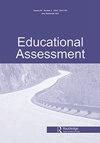Intentional Professional Learning Design: Models, Tools, and the Synergies they Produce Supporting Teacher Growth
IF 2.3
Q1 EDUCATION & EDUCATIONAL RESEARCH
引用次数: 0
Abstract
ABSTRACT The need and desire to understand and adopt formative assessment practices remain high on the agenda at all levels of educational systems around the world. To advance teachers’ use of formative assessment, research attention also needs to be paid to (a) understanding the challenges teachers face when asked to utilize formative assessment practices in subject-specific content areas and (b) to the development of appropriate and sufficiently powerful professional learning designs that can enable change for teachers. To begin addressing these needs, this paper offers a close examination of an intentionally designed professional learning (PL) series to help middle and high school Algebra I teachers understand the formative assessment process and then track and advance their classroom practice. The professional learning design, in this case, is based on a collaborative and formative approach to classroom practice and teacher change with high school mathematics teachers. Together, the PL model and tools provide a formative framework that bridges the theory-practice divide enabling teachers to conceptualize and then plan for, reflect on, and revise the ways in which new formative assessment practices are implemented in their classrooms. Through an analysis of the affordances and constraints of the PL design in practice, this paper provides insights into how discipline-specific professional learning can be better developed and supported throughout the teacher growth process.意向性专业学习设计:支持教师成长的模型、工具及其产生的协同效应
摘要理解和采用形成性评估实践的需求和愿望仍然是世界各级教育系统议程上的重要内容。为了促进教师对形成性评估的使用,还需要关注研究:(a)了解教师在被要求在特定科目的内容领域使用形成性评估实践时所面临的挑战;(b)开发适当且足够强大的专业学习设计,使教师能够做出改变。为了开始解决这些需求,本文对一个有意设计的专业学习(PL)系列进行了仔细的研究,以帮助中学和高中代数I教师理解形成性评估过程,然后跟踪和推进他们的课堂实践。在这种情况下,专业学习设计是基于与高中数学教师在课堂实践和教师更换方面的合作和形成性方法。PL模型和工具共同提供了一个形成性框架,弥合了理论和实践的鸿沟,使教师能够概念化,然后规划、反思和修改在课堂上实施新的形成性评估实践的方式。通过分析PL设计在实践中的可供性和约束,本文深入了解了如何在教师成长过程中更好地发展和支持特定学科的专业学习。
本文章由计算机程序翻译,如有差异,请以英文原文为准。
求助全文
约1分钟内获得全文
求助全文
来源期刊

Educational Assessment
EDUCATION & EDUCATIONAL RESEARCH-
CiteScore
3.20
自引率
6.70%
发文量
24
期刊介绍:
Educational Assessment publishes original research and scholarship on the assessment of individuals, groups, and programs in educational settings. It includes theory, methodological approaches and empirical research in the appraisal of the learning and achievement of students and teachers, young children and adults, and novices and experts. The journal reports on current large-scale testing practices, discusses alternative approaches, presents scholarship on classroom assessment practices and includes assessment topics debated at the national level. It welcomes both conceptual and empirical pieces and encourages articles that provide a strong bridge between theory and/or empirical research and the implications for educational policy and/or practice.
 求助内容:
求助内容: 应助结果提醒方式:
应助结果提醒方式:


